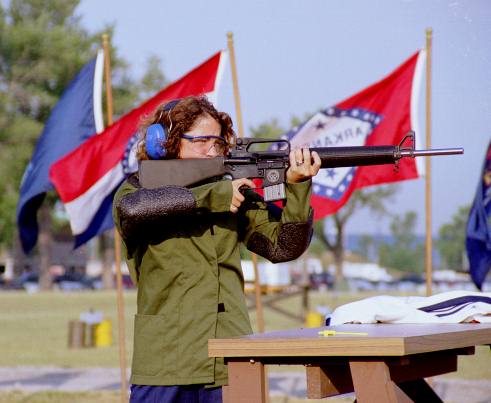“Give a kid a chance to dream and you’ll be surprised by what that dream may turn into.”
 |
On the morning of July 10th, Olympic champion Nancy Napolski-Johnson was the speaker at The First Shot Ceremony for the 2001 National Matches. At the conclusion of her comments she had the honor of firing the ceremonial first shot to officially open the Matches.
Johnson spoke about her first experiences at Camp Perry over a decade ago when she was just getting started in shooting—“I remember the first time my father brought me here…the firing line ran as far as the eye could see. I had never fired on a range with more than 20 points.” She praised the National Matches partnership between the Civilian Marksmanship Program and the National Rifle Association that “means everything to the shooting sports in the United States. Camp Perry is American shooting at it’s best.” |
Nancy Napolski-Johnson’s speech captivated an early morning audience of some 300 people. She spoke fondly about her start in shooting:
“I wanted to be great at something, not just mediocre. When my father suggested that I try shooting, I balked at the idea, and hoped that he would forget about it. Fortunately, he did not forget about it, and when I walked into that shooting range over 12 years ago and shot a rifle for the very first time, I was hooked for life. But back then, I had no idea of the journey I would later take, a journey that has forever changed my life, and a journey that is far from over.”
Johnson made her first Olympic team as a University of Kentucky senior, but, as she described it, she ate a lot of “humble pie,” finishing 36th in a field of 60 shooters in the 1996 Games’ Women’s Air Rifle event. It opened her eyes to the work that lay ahead, and she committed herself to the task:
“Over the next four years, I worked, and I worked hard. I traveled constantly, attending as many competitions as I could, sometimes being home only a few days out of every month. I literally dragged myself out of bed every morning, reminding myself that my competition, the best in the world, were out there training just as hard as I was.”
Throughout her hours of practice, Johnson kept a tough but confident attitude—“It was never a matter of would my hard work pay off, but when.” For Johnson, her ‘when’ came in Sydney, Australia in the 2000 Olympic Games when she won the gold medal in Women’s Air Rifle.
Johnson credited shooting with teaching her concentration and focus, problem solving, and mental toughness. It also led her to a profound understanding, to grasp a truth that could be the credo of every youth in America:
“Without the ability to think, the brain gets lazy, and with laziness comes boredom. We should never allow ourselves the chance to be bored. Life has too much to offer to allow us to ever say ‘I am bored.’”
Johnson told how she currently finds herself “at a crossroads in her journey,” still undecided about her future in shooting. She said, however, that she knew she would always be involved in shooting, “whether it be as a competitor, spectator, coach, volunteer or educator.” She emphasized the importance of placing a high value on education, teaching others about the sport, particularly young people:
“I want people to understand the importance and value in the teaching of our children. How many times have we heard that ‘kids are the future?’ Ten years ago, they would have talking about me. Now I am talking about them. Without kids, there would be no tomorrow, next month or next year. I am often dumbfounded by the number of children I encounter every day who have no hobbies, no goals or dreams. You’ve heard the expression, ‘plant a seed, watch it grow.’ Well, give a kid a chance to dream, and you’ll be surprised by what that dream may turn into.”


